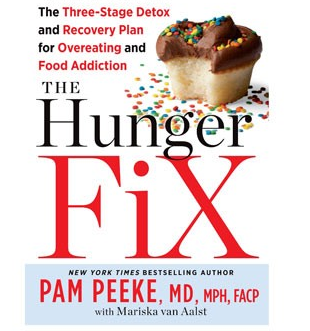Did you know that the brain has the same chemical reaction to sugary/fatty foods as it does to cocaine or nicotine? According to Dr. Pam Peeke, author of The Hunger Fix, the chemical reaction happens before you even eat the food — all you have to do is think about it!
I just watched a video on GaiamTV with Dr. Peeke about food addiction and how to retrain your brain to make healthier choices. Dr. Peeke first started getting interested in the topic of food addiction because she listened to the way her patients talked about food. “I can’t get off this stuff.” “The withdrawal is killing me.” They sounded like drug addicts, and she started to wonder if there was a connection between food and addiction.
She found that there’s a very striking connection — and the same centers of the brain are involved that regulate drug addiction. And, she says, don’t for a second think the food industry hasn’t figured this out.
According to Dr. Peeke, the processed, sugary, starchy, fatty, salty food combinations manufactured by the food industry today reduce your stress hormone in the short-term as you “numb yourself” with food, and this becomes habitual just like a drug habit.
The reward center in the brain (the pre-frontal cortex) is extremely sensitive to any stimulation that even makes you think of the foods you’re addicted to, and dopamine (a neurotransmitter that’s associated with reward, gratification and pleasure) is released in the brain. What ends up happening is that the brain can’t process the high amount of dopamine, so the receptors “down-regulate” so you don’t get overwhelmed – which means it turns off some receptors. So people who have an addiction end up having fewer receptors. This means you don’t feel as much reward, so you continue to need more.
Here are some questions to ask yourself to see if you have a food addiction (and, as Dr. Peeke says, “this is America. If you didn’t have some kind of issue with food, it’d be un-American. I think all of us can relate to this.”)
- When life gets hard, is it your first impulse to eat?
- Do you stockpile emergency snacks in your desk, closet or nightstand?
- Do you have to know where your next meal or food source is going to be at all times or you feel nervous, panicky, or “off”?
- In times of high emotion, do you find yourself eating even when you feel no physical hunger at all?
- Does your relationship with certain foods cause you to have feelings of shame, guilt, disgust or self-loating?
- Is food your best friend and your worst enemy?
With the birth of epigenetics (the study of how your environment and lifestyle can change your genetic code), Dr. Peeke realized there’s a very strong food-gene connection. This means you have control over gene expression. Your DNA is not your destiny – your lifestyle choices are. What you eat and how you live can change the script completely.
The solution? Dr. Peeke says the key is “mind, mouth and muscle.”
Mind: Meditate. When you do regular meditation, you activate the pre-frontal cortex of your brain and you’re carving new pathways so you can default to a better place when making decisions about food. Strengthening the pre-frontal cortex also helps you to connect actions with consequences.
Mouth: Eat whole foods and you’re building a bigger brain. Quality food is the key. Quality is what your genes are asking for, and whole foods are healing foods. Detox off your “crack,” Dr. Peeke says. Completely eliminate the foods that you feel addicted to and replace them with healthy, whole foods.
Muscle: Regular physical activity – even walking on a routine basis – can strengthen your pre-frontal cortex. The reward circuit in the brain will start to be satisfied with healthier fixes, rather than your addictions (what Dr. Peeke calls “false fixes”).
Dr. Peeke’s 3 stages of recovery from food addiction:
Stage 1: Detox from your “crack”
Stage 2: Replace the false fixes with healthy fixes
Stage 3: Engage in the above “mind, mouth, muscle” practices daily
Other advice? As with any addiction recovery program, don’t focus on having to giving something up “forever” – just take things one day at a time.
Dr. Peeke has a lot more to say about the brain and food addiction, and I found her video really interesting as it relates to addiction in general. She has a ton of great insights. If you want to know more, you can watch the whole video here on GaiamTV.
What do you think about Dr. Peeke’s advice? I’d love to hear your thoughts.




Leave a comment!